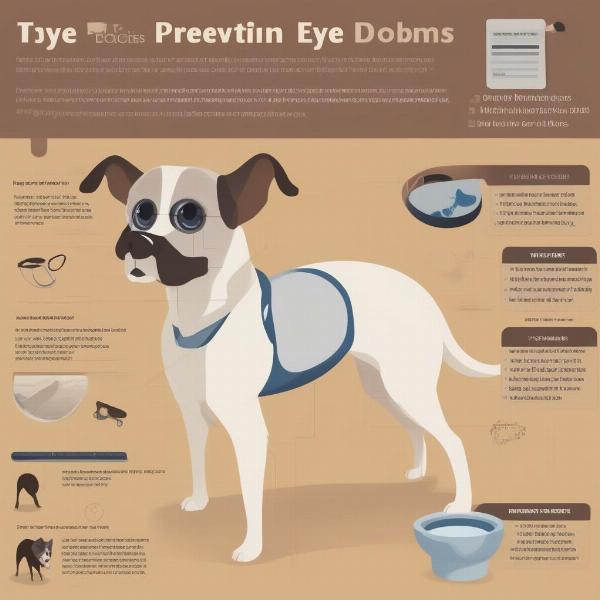Golden eye ointment is a common term used by dog owners when searching for solutions to eye problems in their furry friends. It’s important to understand that there isn’t one specific product called “golden eye ointment.” This term likely refers to various ophthalmic ointments used to treat eye infections, irritations, or injuries in dogs. Finding the right treatment for your dog’s eye condition requires careful observation and, ideally, a veterinarian’s diagnosis.
Understanding Dog Eye Problems and Treatment Options
Eye problems in dogs can range from minor irritations to serious infections. Symptoms can include redness, discharge, squinting, excessive blinking, and pawing at the eyes. While some issues might clear up on their own, others require veterinary attention. Never attempt to self-diagnose and treat your dog’s eye condition without consulting a professional. Misdiagnosis and incorrect treatment can worsen the problem and even lead to vision loss.
Different types of eye ointments contain various active ingredients, each targeting specific conditions. Some common ingredients include antibiotics to combat bacterial infections, antivirals for viral infections, anti-inflammatories to reduce swelling and pain, and lubricants to soothe dry eyes. Your veterinarian will prescribe the appropriate ointment based on your dog’s specific needs.
Administering Eye Ointment to Your Dog
Applying eye ointment can be tricky, especially if your dog is squirmy. Here’s a step-by-step guide:
- Wash your hands thoroughly: This prevents the introduction of bacteria into your dog’s eye.
- Gently restrain your dog: Have someone help you hold your dog securely.
- Clean the area around the eye: Use a damp cotton ball to remove any discharge.
- Apply the ointment: Gently pull down the lower eyelid and squeeze a small amount of ointment into the pocket created. Be careful not to touch the tip of the tube to your dog’s eye.
- Close the eye for a few seconds: This helps distribute the ointment evenly.
When to Seek Veterinary Care for Your Dog’s Eyes
It’s crucial to consult a veterinarian if your dog displays any of the following symptoms:
- Persistent redness or swelling
- Yellow or green discharge
- Squinting or excessive blinking
- Pawing at the eyes
- Changes in pupil size or shape
- Cloudiness in the eye
- Visible injury to the eye
Preventing Eye Problems in Dogs
While not all eye problems are preventable, some simple steps can help protect your dog’s eyes:
- Regular grooming: Keep the hair around your dog’s eyes trimmed to prevent irritation.
- Eye exams during vet visits: Early detection of eye problems can prevent them from becoming more serious.
- Protective eyewear: Consider using dog goggles during activities that could expose your dog’s eyes to debris or injury.
 Dog Eye Care Tips
Dog Eye Care Tips
Conclusion
Maintaining your dog’s eye health is crucial for their overall well-being. While the term “golden eye ointment for dogs” might be used colloquially, it’s essential to understand that proper diagnosis and treatment from a veterinarian are vital. By being attentive to your dog’s eye health and seeking professional help when needed, you can ensure your furry friend enjoys clear vision for years to come.
FAQ
- Can I use human eye ointment on my dog? No, never use human medications on your dog without consulting a veterinarian.
- How long does it usually take for dog eye infections to clear up? The duration of treatment varies depending on the severity and type of infection. Follow your veterinarian’s instructions closely.
- What are some common causes of eye infections in dogs? Common causes include bacteria, viruses, allergies, irritants, and injuries.
- Is there a way to prevent my dog from pawing at their eyes after applying ointment? Using an Elizabethan collar can prevent your dog from rubbing or scratching their eyes.
- Are certain dog breeds more prone to eye problems? Yes, some breeds are genetically predisposed to certain eye conditions.
- Can dry air cause eye irritation in dogs? Yes, dry air can contribute to dry eye and irritation.
- How often should I clean my dog’s eyes? Clean your dog’s eyes as needed, typically when there is visible discharge.
ILM Dog is your trusted resource for expert advice on all aspects of dog care and wellbeing. We offer a wealth of information on dog breeds, health, training, nutrition, grooming, and much more. From choosing the right breed to providing the best possible care, ILM Dog is dedicated to helping you navigate the joys and challenges of dog ownership. Contact us today for personalized guidance and support: Email: [email protected], Phone: +44 20-3965-8624.